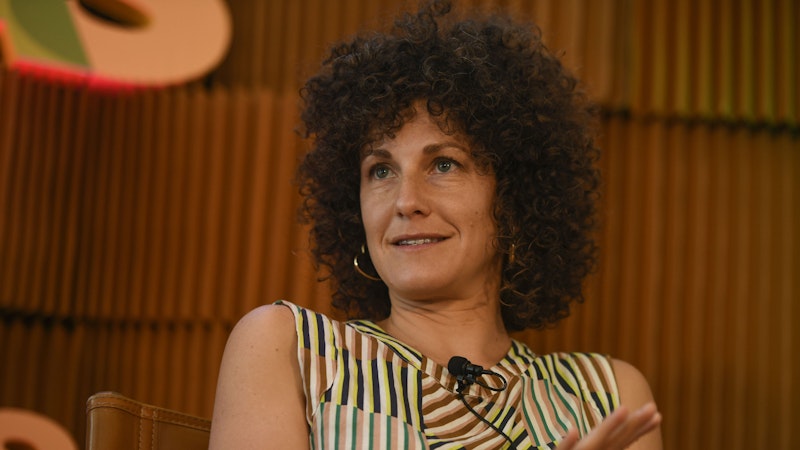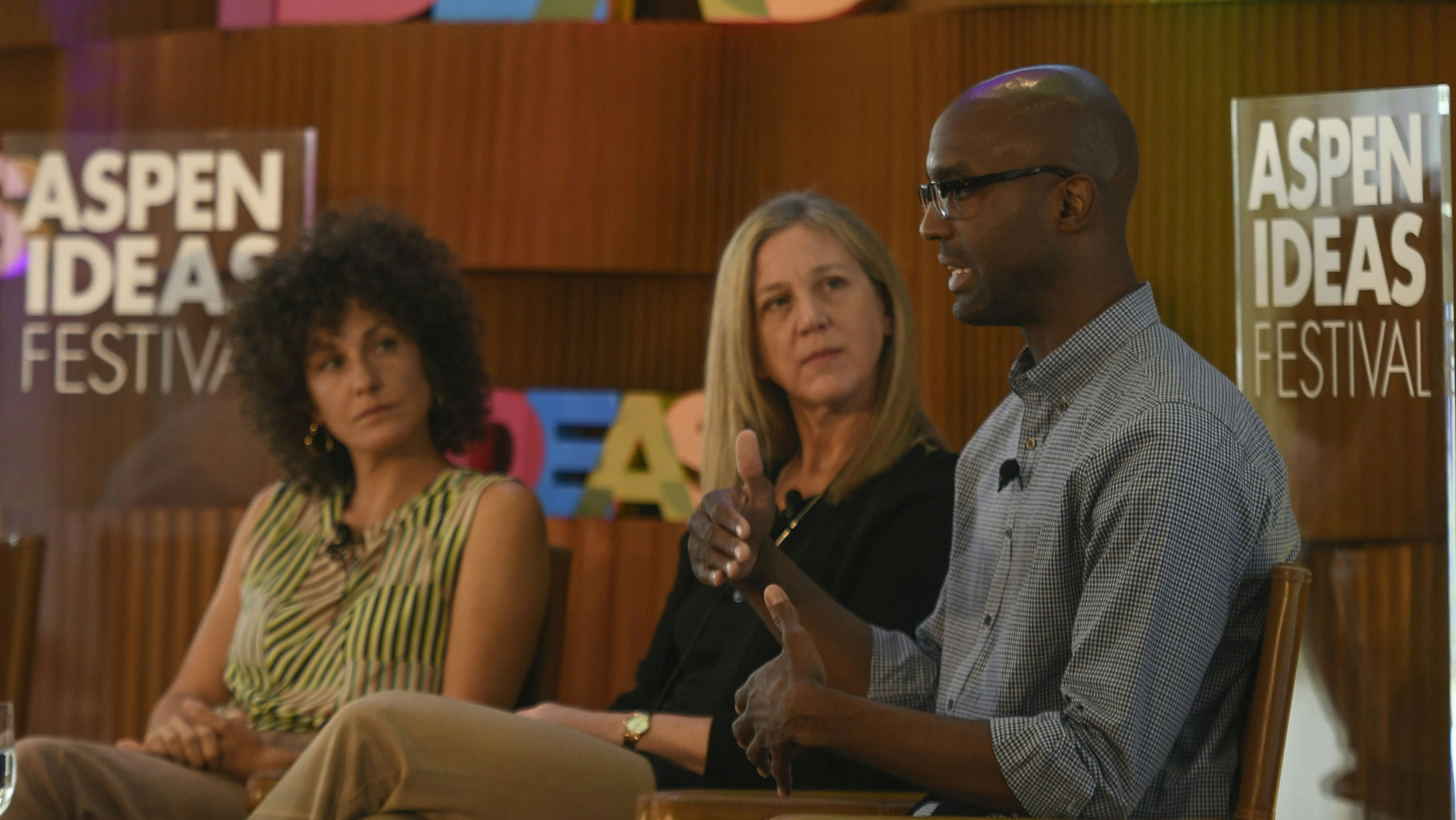
Same Game, New Rules: Parenting in 2018
Setup
Raising well-adjusted children has always seemed difficult, but now the task — as well as the duty to protect them — seems more difficult and necessary than ever. As our lives are disrupted by technology and identity is viewed with more nuance than ever, how do we parent well in 21st century? How can we work to support our children instead of confining them? What stresses do boys, girls, and nonbinary children experience today that they had not before? What new opportunities do our children have, and how do we harness them for the benefit of our families and societies?
- 2018 Festival
- USA
Adults fail children when we stereotype them
Professor Joseph Nelson has seen first-hand how harmful stereotypes can be to children as they develop and grow. Whether it’s in the classroom or at home, adults pigeonhole children into thinking and feeling in ways that adults expect them to. Black boys, for example, are seen as hypermasculine, hypersexual, and violent, and they’re more likely to think of themselves in those ways because of how adults treat them.
Author and professor Lise Eliot follows up on Nelson’s comments with a reminder that adults may tell children to follow their dreams, but they often still think of children as hard-wired to follow a certain path because of their race, gender, etc.
-

Lise Eliot: We may say to [boys], ‘you can be anything.’ But part of us really doesn’t believe that. There really are these narrow things you can be. We wouldn’t be too excited if you turned out to be a nurse or a teacher or a caregiver. So boys get this very mixed message, and it makes it a challenge for them. And it diminishes the range of things that they can feel accomplished and creative in.
What does real accountability in schools look like?
For many educators, standardized tests are both loathsome and a fact of life. But they’re most often talked about in context of teachers and school performance, not their impact on student development. Watch as Lise Eliot and Joseph Derrick Nelson discuss how a better vision of standardized tests might help both teachers and parents:
Single-parent families: an unfortunate reality?
Are single-parent families a source of hardship, the result of hardship, or both? Moderator David Leonhardt dives into a topic that has been dogging American society for centuries. See how Lise Eliot responds to his question:
Ambiguity isn’t comfortable, but children are here to help
Prepare to be uncomfortable, warns writer Sarah Rich. Children are embracing ideas of gender and identity that invite ambiguity, and it’s no secret that many people don’t respond well to ambiguity.
Big IdeaFrom a cultural standpoint, where I think we’re headed - where I hope we’re headed - is to the idea that individual people are going to express themselves in many ways and gender doesn’t have to be the number one primary sorting mechanism for how people distinguish themselves starting at a young age.Sarah Rich
But Joseph Nelson reminds us that our best resource for learning to support children who adopt ambiguous identities is the children themselves. Listen, ask, and learn, says Nelson, and work together to build a support system.
How do you solve a problem like cell phones?
First it was TV, then it was computers, now it’s cell phones. Cell phones are incredible pieces of technology, but in some ways they’re also a pandora’s box. How should parents and educators incorporate cell phone use into the daily life of children?
The smartphone generation
In response to an audience question about appropriate cell phone usage for children, Sarah Rich argues that the best thing we can do is to model for children what a relationship with cell phones looks like.
Learn More
Additional Information
Explore More
USA

Capitalism has delivered prosperity for many, but not for all. Disparities according to gender, race, and geography have left millions behind, while rising concentrations of w...

Global conflicts and health crises have put into stark relief deeply-ingrained gender roles in society. Yet the past years have also seen record-high numbers of women running...


Creativity is as intrinsic to our species as any of our basic instincts, says Debbie Millman, designer and curator. But for millions of people in the United States, the abilit...

Of course, Black history shouldn’t just be a month-long nod on our yearly calendar — it is inextricable from American history and fundamental to the very soul of our nation an...


Many more Americans are struggling to survive and make ends meet than is typically portrayed in the media and public policy debates. And when poverty is depicted, harmful and...


America’s “second founding” came on the heels of the Civil War, when the architects of the 13th, 14th and 15th amendments thought long and hard about how to enshrine civil rig...


It’s been decades since the United States has updated its immigration policies in any sort of comprehensive way, and the problems and suffering at the southern border have per...


Whether they publicly tout it or not, U.S. technology companies play a powerful role in politics, cultural issues and the way we live. Founder and investor Peter Thiel is one...

The 2024 presidential election is only months away, and the past few weeks alone have brought shocking headlines that change the political ground we stand on — an attempted a...


Sizable electorates around the world are flocking to populist candidates who promise power, domination and a return to better times. The global experiment in liberalism seems...


The federal right to abortions in the United States has been overturned, access to contraception and IVF services are threatened in many states, and the gender wage gap persis...


The Supreme Court has issued another series of controversial and consequential decisions this term, fueling discussion on the current state of the judicial branch. Recent poll...

Americans feel more polarized than ever, but two governors from opposite sides of the aisle have made it their mission to show otherwise.

The rollback of reproductive rights, the push to end no-fault divorce, and gun laws that allow domestic abusers to own a firearm are turning the clock back on women’s rights....

Former Senators Bill Nelson and Kay Bailey Hutchison discuss the bipartisan work that defined their careers, suggest ways for today’s elected officials to find common ground,...

As the Supreme Court concludes another contentious term, it is once again reshaping the legal landscape. With cases on abortion, gun rights and social media — and potentially...

Two billion people worldwide are set to vote in elections this year, amid global conflict, societal mistrust, broken information ecosystems — and the truth-destroying disrupti...

Amid seismic shifts in the entertainment world, Oscar-, Golden Globe- and Emmy-winning Brian Grazer has managed to keep pivoting to new ways to tell stories in movies, TV and...

Images communicate truths, and also lies. Learning to pay attention to photographs can help us discern. An art and cultural historian and a visual artist host a master class o...

Peter Thiel has made no secret of his feelings about economic and cultural issues. Hear him discuss his vision for the future, his bets on AI and digital currencies, his thoug...














